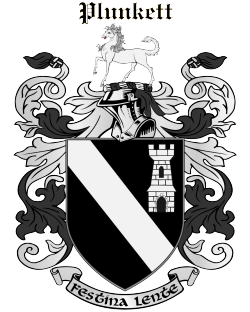


Following the Anglo-Norman invasion of Ireland in 1170 many Norman, English, Welsh and Scottish families settled throughout the country and among the early Anglo-Norman settlers were the first of the Plunketts.
The surname Plunkett has been associated with Meath, Louth and Dublin for over eight hundred years. In 1403 the senior branch of the family, headed by Sir Christopher Plunkett, acquired the dignity of Lords of Killen in Meath and the tenth Lord Killen, Lucas Plunkett, was created Earl of Fingall in 1628. Other branches held the titles Barons of Dunsany and Ealrs of Louth. Today the surname has over one thousand bearers in Ireland, the majority of whom are to be found in the vicinity Dublin and Meath.
The original Anglo-Norman name was le Blanchet or le Blanquet, a nickname meaning 'pale, white-skinned'. The surname is now written in Irish as Ploinceid or Pluinceid.
The founder of the family was John Plunkett who accompanied William the Conqueror to England in 1066; he died in 1082, and his direct descendant John Plunkett is recorded in Louth during the reign of Henry III. John's elder son was the ancestor of Sir Oliver Plunkett who was created Lord of Louth in 1541, and his younger son Richard was the grandfather of Sir Christopher Plunkett, created Lord of Killen in 1403. Thomas Plunkett of Louth was Chief Justice of the Common Pleas of Ireland in 1316. Lucas Plunkett, first Earl of Fingall, was the father of Christopher Plunkett (died 1649) who was outlawed for his support of the Cromwellian Rebellion of the 1640s. St. Oliver Plunkett, Archbishop of Armagh, was martyred for his faith in 1681, and John Plunkett was a noted Jacobite in 1690. William Conyngham Plunkett (1764-1854), Lord Chancellor of Ireland, belonged to a Monagham branch of the family.
Investigations into the origin of names determined that church officials and scribes would spell surnames as they sounded. Therefore, during the lifetime of many of our Ancestors, a name could be spelt in many different ways. Some of the spelling variations for the name Plunkett include the following: Plunkett, Plunket, Plunkitt, Plunkit, Plunked, Plunkedd, Plunkidd, Plunkette, and many more.
On a black field, the color of Wisdom and Constancy, is a white bend (diagonal stripe) for Military Honor and Prowess in Battle: in the upper corner is a castle, a symbol of Strength, Stability and Protection.
